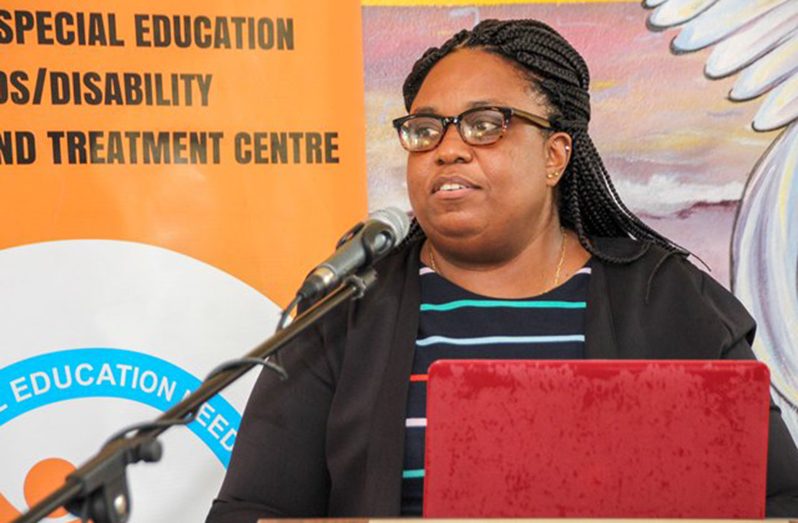GIVEN that testing and other diagnostic procedures are not fully available or vigorously applied, it is believed that there are many undiagnosed children in the school system who are suffering from the Autism Spectrum Disorder (ASD). Notwithstanding the disorder being a common disability, there still remains a lack of awareness and a lot of prejudicial feelings towards such persons. This has trickled down to the school system. There are about 42 children in the public education system who have been diagnosed with autism.
These children and those with other special needs or disabilities, are being monitored by the Ministry of Education’s Special Education Needs (SEN) Unit, which has officers in five regions, and monitors 13 special needs institutions across the country. “Recognition that students learn differently provides challenges to the teacher. The system response will be slow as teachers are also persons with many of the past prejudices and they must learn to abandon those prejudices in presence [of] the findings and changes occurring in education globally,” the National Special Education Needs Officer, Savvie Hopkinson-Hamilton, told the Guyana Chronicle in a recent interview.
The SEN Unit is a subsection of the National Centre for Educational Resource Development (NCERD). The unit continues to strive towards getting teachers more in line with the changing needs of the education system. “The SEN Unit has, over the recent years, provided continuous training to equip teachers with the knowledge and skills to support the needs of students with special education needs and disabilities including those with ASD. However, many teachers have not as yet been exposed to specific training to work with students on the spectrum,” Hopkinson related. ASD is a developmental disorder characterised by difficulties with social interaction and communication, and by restricted and repetitive behaviour. This presents challenges for the education system. “Every child with autism presents unique needs and behaviours, and require supportive staff to assist in overcoming many of the challenges faced in the classroom. What we are talking about here is a major paradigm shift in education,” Hopkinson explained to this publication.
Hopkinson said that, notwithstanding the need for teachers to become more equipped to deal with the students, the ministry is cognisant of the challenges that face special needs teachers who deal with autistic learners, and those who deal with other types of special students.
“Autism is only one of the learning developmental challenges that teachers face in every classroom. We cannot over-emphasise the value of teachers nor minimize the enormous tasks that confront them. The home and the community are definitely in partnership with the school to prepare the children of the nation for today’s competitive environment,” she said.
The unit is currently celebrating Autism Awareness Month with a number of activities throughout April. The activities, which began on April 1 and will run until April 30, involve a number of virtual awareness fora, sensitisation outreaches, awareness walks, a virtual concert, several radio and television broadcasts, panel discussion and an inter-secondary school debating competition.
CHALLENGES
Hopkinson noted that, aside from tearing down prejudices, assessing children who may have the disorder also presents its own challenges.
“We cannot provide data for students on the spectrum in all administrative regions, schools or levels. This would require comprehensive evaluations and monitoring to avoid labelling or misdiagnosis. The Ministry of Education’s Special Education Needs Unit is not presently equipped to perform full testing or working with the entire public school system but provides interventions where blatant and obvious cases exist,” Hopkinson explained to the Guyana Chronicle.
Even outside of Guyana, diagnosing ASD can be difficult because there is no medical test, such as a blood test, to diagnose the disorder. Doctors look at the child’s developmental history and behavior to make a diagnosis. However, ASD can sometimes be detected at 18 months or younger.
Through the MoE, learners are placed in special educational institutions, such as David Rose Special School where there is an Autism department dedicated to those on the spectrum.
“The SEN Unit continuously provides teaching/learning resources that are concomitant with their learning styles. Students of special schools were provided with assistive devices such as tablets with software that matched their educational needs. Currently, students are engaged in homeschooling since March 2020,” Hopkinson said.
The ChildLinK organisation is also engaged in a project through which it works with 26-30 learners on the spectrum within mainstream schools. There is also the Step by Step School, a charitable non-governmental organisation, entirely dedicated to providing an institution tailored to children with autism.
While the present situation in the public education system leaves much room for improvement, Hopkinson is hopeful that the system will one day become fully equipped to provide a wide comprehensive evaluation through the Special Education Needs Unit and diagnosis services through the Regional Special Education Needs and Disability Diagnosis and Treatment Centre.
“In this way developmental difficulties will be identified earlier and interventions will take place sooner. This would lead to all students with Autism having an Individual Education Plan (IEP) which would be tailored to their specific needs and learning styles. Teachers and parents would work according to the plans to support the needs of the child,” she said.




.png)









